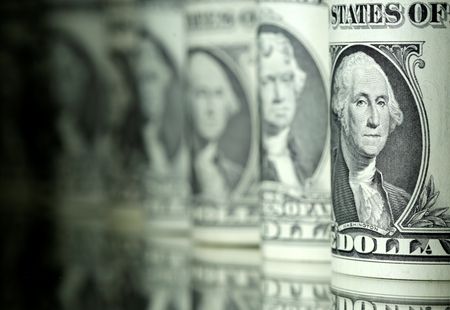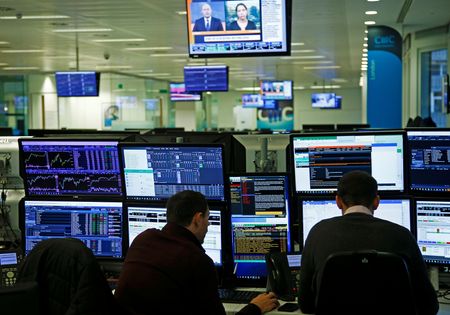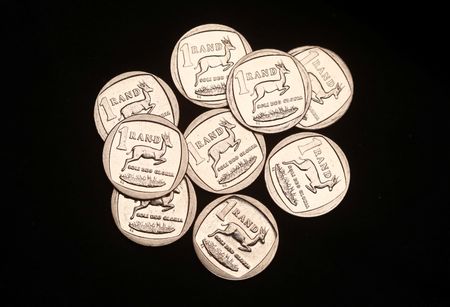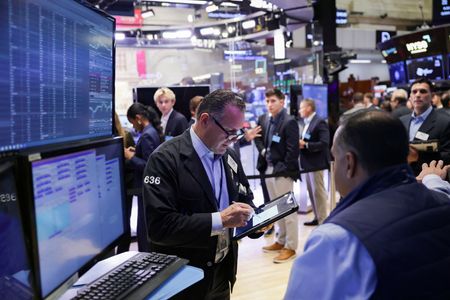By Rocky Swift and Amanda Cooper
TOKYO/LONDON (Reuters) -The U.S. dollar on Friday headed for its worst weekly performance since July, as a flare-up in concern about trade tensions and signs of mounting risk in regional American banks drove investors into safe-haven currencies like the Swiss franc and the yen.
Signs of weakness were also emerging in the U.S. economy and because the federal government shutdown has choked off the release of key macroeconomic data, investors have less certainty than usual about what is happening on the ground.
The Swiss franc hit its strongest level in a month and the yen also rallied, although part of its rise was attributable to Bank of Japan Governor Kazuo Ueda’s discussion of factors that could lead to a rate increase this month.
Compounding concerns about trade, Fed independence and the U.S. shutdown are making the greenback vulnerable to the “debasement” trade, where investors seek assets that can’t easily be devalued, said Pepperstone research strategist Dilin Wu.
“It’s really hard to find a bullish scenario for the dollar index,” said Wu. “Instead of betting on any currency by a single sovereign credit, people are rushing into gold, cryptocurrency, and other assets as a risk hedge.”
The Swiss franc was one of the top-performing major currencies against the dollar, which slid 0.4% to 0.7898.
The dollar index, which tracks the U.S. currency against six of its counterparts, headed for a 0.7% slide this week – the largest since late July.
The dollar also fell 0.39% against the yen to 149.825, trading below the 150 line for the first time since October 6.
BOJ Governor Ueda said in Washington on Thursday that the central bank remains ready to increase its key policy rate if the likelihood of its growth and price forecasts materializing increases.
The yen has been on the defensive since fiscal dove Sanae Takaichi was elected to head Japan’s ruling Liberal Democratic Party earlier this month. But a vote to install her as prime minister was delayed after a split with the LDP’s coalition partner.
Reuters learned on Friday that Japan’s lower house scheduling committee board has agreed to hold a parliamentary vote to select the next prime minister on October 21.
“Rising U.S.-China trade-war worries, concerns over U.S. regional banks – these are reminders for the market that, actually, it’s not quite as rosy as investors were pretending that it was,” City Index strategist Fiona Cincotta said.
“There is definitely a safe-haven bias to trading … in the equities market, S&P 500 futures are down 1.4%, you’ve got gold hovering around record highs and the Swissie outperforming. Everything about this is telling us it’s risk-off, safe-haven demand,” she said.
The euro rose 0.1% to $1.1698, while sterling fell 0.2% to $1.341.
Fed Governor Christopher Waller said he is on board for another interest rate cut at the U.S. central bank’s meeting later this month because of the mixed readings on the state of the job market.
Stephen Miran, the Fed’s newest governor and an economic adviser to U.S. President Donald Trump, reiterated support for more aggressive rate cuts at upcoming meetings than the one favored by some of his colleagues.
Miran’s temporary term expires at the end of January, while Fed Governor Lisa Cook remains in place as the case over Trump’s attempt to fire her winds through the courts.
The Fed’s Beige Book offered little support to U.S. rates, pointing to emerging signs of economic weakness, including rising layoffs and reduced spending among middle and lower-income households.
(Additional reporting by Rocky Swift in Tokyo; Editing by Shri Navaratnam and Kim Coghill)











